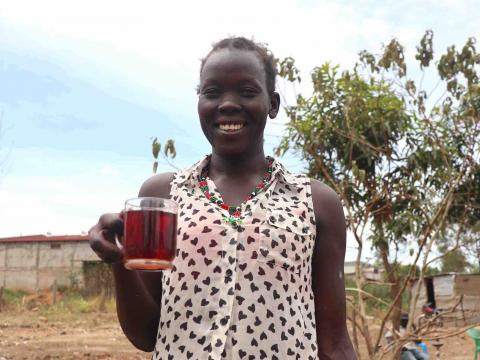South Sudan’s tea shops, women’s resilience, hidden heroes and new way of working amid COVID-19

I wake up early enough every morning in Juba to see the tea shops open in front of our team house. The two ladies running tea businesses few feet apart would meticulously sweep the surroundings clean and the guys, which I conveniently assumed are their husbands, would set-up the chairs.
At seven in the morning, the shops are ready and customers start to trickle, comfortably seating themselves in blue plastic chairs, the other shop usually organizes in circles while the other one in a long line. In the afternoon, the chairs would be a disorganized array but the women would patiently put them back to order as people leave.

Mary, 22, and already a mother of four, sells tea just outside of an internally-displaced camp in Juba with over 3,000 people. That day when World Vision and the World Food Programme distributed food, she was busy boiling water in the pot and setting shop along with friends who were helping in the business.
She told us it is her only means of livelihood. On a good day, she earns at least SSP1,000-2,000 (USD4-8). Without the tea shop, Mary said, they have no other means to earn income. “We will not eat”, she says with a wry smile. There are thousands of Mary's around South Sudan with the same dilemma.
What if the tea shops will be closed down? What if supplies that cross the borders from Uganda, Sudan or Kenya ran out and small businesses dry up. What if customers stop coming as jobs close? In South Sudan where over 7.5 million suffer from lack of food, the answer is clear - more hunger pains.
More people, especially children and the most vulnerable like the elderly and those with disabilities, will go hungry and suffer more. These humble tea shops symbolizes a part of the economy that sustains people’s resilience and survival. They also symbolize their hope and struggle to keep on with the dream that there is light at the end of the tunnel if they persist to reach it.
The South Sudanese people are among the most resilient, hopeful and relentless that I have met in the many countries I have been. You see people laugh amid the pain, find humor in frustration, and never give up because they believe tomorrow will be better.

Angelo Mathuch and Dennis Ayume represent the faces of the resilience of every South Sudanese. Both colleagues in World Vision, they share the unimaginable journey as children during the most tumultuous years of South Sudan’s conflict. They endured, struggled, persisted and kept going.
What stood out in Angelo's and Dennis's stories? The did it because of their families and to be part of the rebuilding of their country. They lived not because of themselves but for others.
I have seen these among the former child soldiers. They went through the most harrowing experiences but they go back to school, keep plowing the farm and go on to open small shops. They would share with you their dreams and less of their suffering. They do feel the pain, but the spirit of an optimist is alive and burning.
How do you define heroes? It’s in every face you meet. It is you and me, our family, our fellow humanitarians, our neighbors, our faith leaders, the health workers, the shopkeepers, the vendors, the drivers, the security guards, the children, the cleaners; practically every human being on earth.
Despite all the suffering it brought the world, COVID-19 unknowing unleashed the heroism that existed in each of us. My fervent prayer is that we will be able to keep this in our hearts long after we have defeated the virus. I know we can.

Communications Manager Cecil Laguardia has been working in South Sudan for two years now. Prior to this assignment, she worked in World Vision's offices in Southern Africa Region, Kurdistan Region of Iraq and the Asia Pacific Region. I Photos by Scovia Faida Charles Duku, Communications Officer